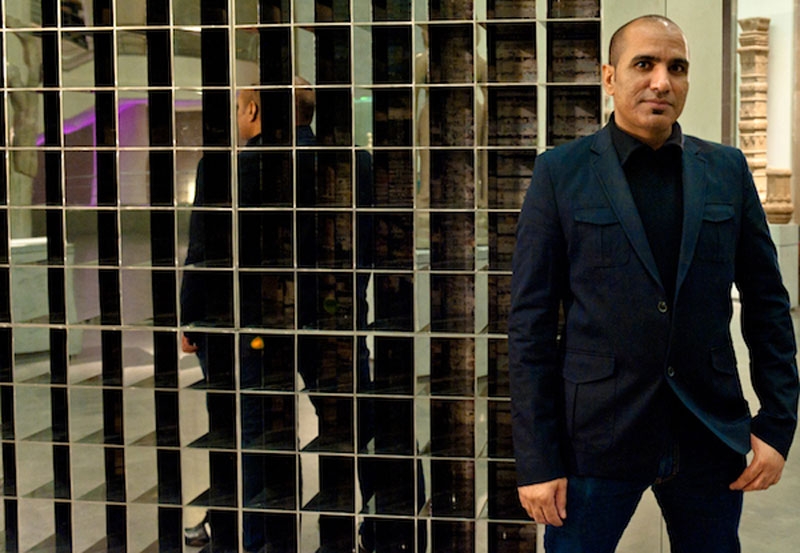Podcast: Rashid Rana's Pakistan: 'A Mini-Version of the Globe'

This is the latest installment of a series of podcasts entitled Another Pakistan, a candid and thought-provoking series of podcast conversations brought to you by the Asia Society and the Watson Institute at Brown University, produced by Zarminae Ansari and Ben Mandelkern, with support on the ground from Aman ki Asha.
Click here to learn more. Scroll to the end of this post to listen to the podcast.
LAHORE — Rashid Rana is Pakistan's prize entry in the global art scene.
Images that contradict themselves on closer inspection are his signature work. In his Veil series, for example, what look like stylized impressions of shrouded Muslim women turn out to be composed of innumerable tiny frames of white European and American women from hard-core Internet pornography. So, in effect, two pretty gross distortions of womanhood East and West, two over-familiar sides of the same debased coin, are addressed in a one composite image.
Stunning at a formal level, the work is idea-driven, too. We are talking about some of the "historical and political connotations," as he calls them. Overall in his work, and in conversation in his Lahore studio, Rana seems to be saying: Look again at Pakistan! It's not freakish or a world apart. It may in truth be a fair sample of turmoil and transition almost anywhere in this 21st century. And of course we may all be involved in what it is going through.
I don’t think of Pakistan in isolation… Pakistan is a mini-globe, a mini-world. Whatever exists in the world today — the polarity, the polarization of the extremely rich and extremely poor and all the diversity and variety that exist are encapsulated in this place called Pakistan. It's a mini-version of the entire globe.
I Love Miniatures was Rana's breakthrough piece almost ten years ago, born in a spirit of mischief and light mockery. What appears across the gallery to be his version of a Mughal emperor's miniature portrait turns out to be a digital montage of tiny photo images of advertising billboards in Lahore. This was Rana's cheeky response to a "neo-miniaturist" vogue in the '90s — a revival of tradition that caught on in London as well as in Pakistan.
"My whole issue," he's remembering, "was that only something with an ethnic label was going to be recognized as Pakistani. I thought: if this is the way it's going to be I’m going to subvert the idea with what I want to say and do. So I showed them a miniature painting they wanted to see, and made it with the immediate visual culture of my city today. And that's how a journey of documenting paradoxes and dealing with duality started in this formal and conceptual device."
In Rana's Red Carpet series, rugs that look first like the familiar icons of Eastern craft and beauty reveal on a closer look the artist's own photographs of animal blood and gore in a Lahore slaughterhouse. So he is playing with a pixielated pointillism that declares he has taken membership in the digital age and a global conversation — but mainly to talk back with these stylish and intellectually challenging spoofs of media, pop culture, mass marketing, headlines, first impressions and common talk.
Listen to the podcast:
Christopher Lydon is the host of Radio Open Source, a conversation on arts, ideas and politics from Brown University's Watson Institute.
More Another Pakistan podcasts
Additional links:
Rashid Rana in Asia Society's Hanging Fire exhibition


